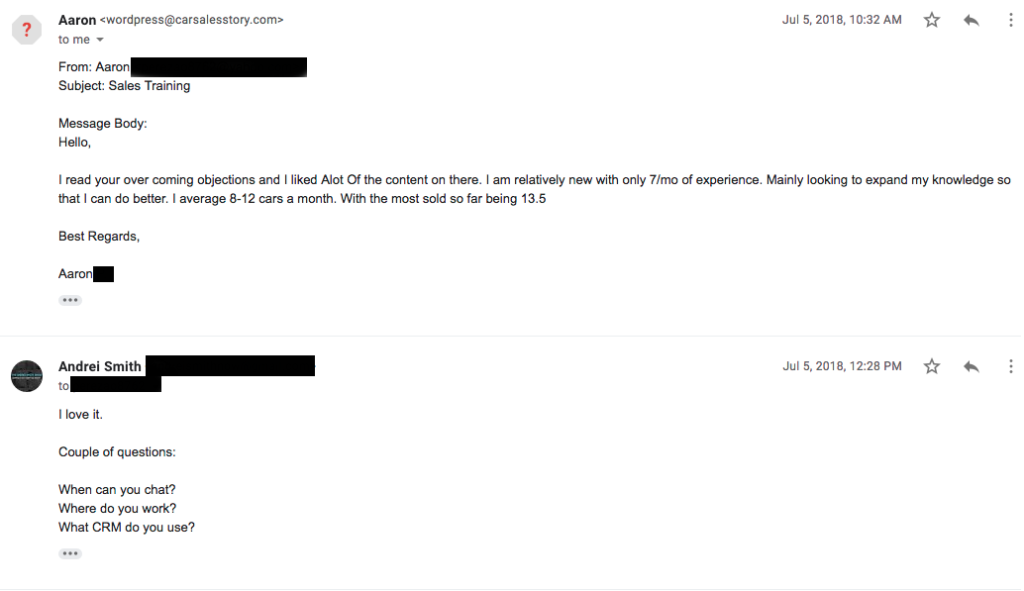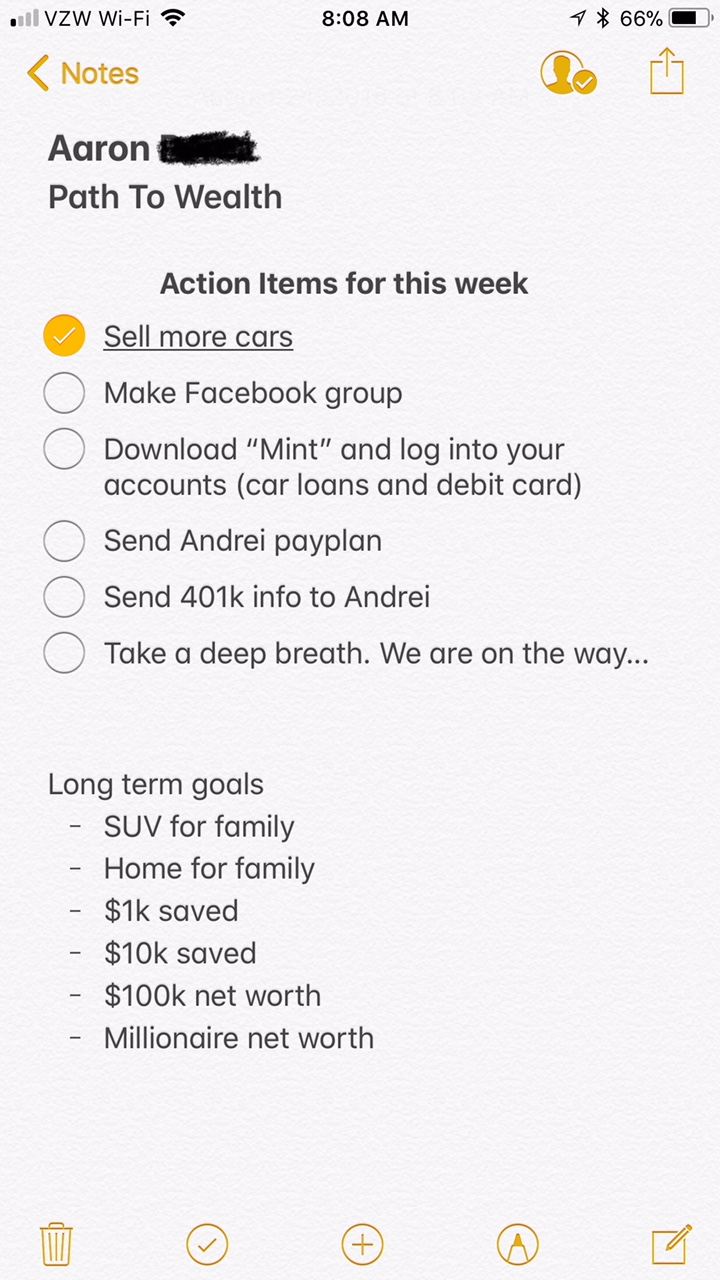Table of Contents
Everyone needs guidance. In my career so far, I’ve had a number of people who have provided me with one-on-one sales coaching. The skills, routines, and discipline that I’ve taken from them have been invaluable.
In the last few months, I’ve begun hosting my own one-on-one sales coaching, paying forward what has been given to me. There is no greater inspiration than to teach, and no greater tool for accountability. One of the most gratifying parts of my evolving career has been to work with one-on-one sales coaching clients. They have broadened my horizons by sharing with me challenges that I have never faced in my own career.
[mc4wp_form id=”25181″]
One-on-One Sales Coaching: Becoming A Good Student
Before you can ever coach, you must learn how to be coached. A good teacher is once and always a good student. Learning is a constant process, so embrace it now.
I’ve always sought to make people I look up to into my teachers. I try to capture the essence of what makes them successful. I’ve had coaches throughout my adult life and none of the time with them was wasted. There is a method to being a good student.
One-on-One Sales Coaching: Finding The Right Mentors
First things first, you need to find good mentors and convince them that you are worth teaching. You must be proactive, attentive, and respectful of their time.
The mentors you seek out do not need to be the exact model of who you are trying to become. They should have incredible talents that you want to emulate, combined with a personality that is agreeable with yours. Think right now of the people that you interact with that have both a talent that you want to emulate and a personality that you get along with. That person is someone you could learn from.
Pick someone that you look up to! What is it about the potential mentor that you want to capture? What have they accomplished that you want to emulate? One-on-one sales coaching is particularly suited to this type of talent acquisition, and you should think of your teachers in this way. When you know what you want to learn from them you will have a greater drive to be a good student.
Asking For Help Is A Great Compliment
Almost everyone has someone that they both look up to and get along with, so why isn’t one-on-one sales coaching more popular? The practice is mutually beneficial to both the teacher and student benefit greatly.
The biggest hold-up? Fear. Most potential students never actually ask for any type of “formal” coaching from their potential mentors for fear of rejection and embarrassment.
What if they don’t think I’m worthy?
What if they don’t have time to share with me?
What if they think it’s weird I want to ask them about their success?
Thankfully, we can take a page from the mastering sales mindset when addressing these fears. If you don’t ask, you’ll never know. I believe it is better to be painfully rejected 10 times to get 1 good mentor than to never coached at all.
Reframe your thoughts on the subject.
Asking for advice and guidance (if done right) is a respectful and complimentary thing to do. In the few times that I have been rejected, my relationship with that person has always improved. Why? Because although they don’t have time to help me (understandable!), they appreciate my “looking up” to them.
It’s a huge sign of respect to say, “I’ve been watching your success and want to be like you”. Wouldn’t you appreciate it if someone said that to you?
Simple Mistakes
There are a few potential mistakes that can be avoided with a little planning.
First, understand that asking for someone to guide you and be your mentor is a big ask. As such, don’t be surprised if people say no. People have other things in their lives that might come before you. That’s okay. The last thing you want is someone to say yes and then half-ass their time with you.
Secondly, don’t start by asking Tim Ferris or Tony Robbins to be your mentor (to start). Famous people who are thought leaders, authors, or public figures generally tend to be both very busy and very expensive. Hundreds (if not thousands) of people are vying for their daily attention. Most importantly, their guidance is not necessarily that much better than those people one step less popular. Often times the difference between a “brand name” thought leader and their contemporaries is not skill but timing and luck.
As an addendum to number two, I think that it’s critical to seek out local mentors. My best mentors and coaches have been people who I work with, simply because proximity is critical to action. If I see my coach every single day my potential accountability is exponentially greater than with someone I talk to once a week. If my coach is also my boss, they can and will pay attention if I’m slacking!
Third, don’t start too formal. Many potential coaches have actually never coached before, so it’s critical that you are tactful in your approach. If you were the potential teacher which of these approaches is better:
“Hi! I am a huge fan of the way that you carry yourself and what you have been able to accomplish. I’m trying hard to be the best person I can so I was wondering if you can be my LIFE COACH!!!!“
or
“Hi! I am a huge fan of the way that you carry yourself and what you have been able to accomplish with X and Y. I was wondering if you had time to grab coffee sometime this week so I could ask you a few questions?“
Approach with a light touch!
“…asking someone to be a formal mentor is the absolute worst way to get a good mentor, because it’s like ‘hey! do you want to sign up for a unpaid part time job because you have so much free time?”
-Tim Ferris in interview with Ryan Lewis, “The Obstacle is The Way” by Ryan Holiday, Audiobook, Track 39
Potentially Critical Mistake That You Absolutely Must Avoid
This one deserved its own header. If and when you find someone that you hope to be your mentor, read their damn book first (if they have one). Read their blog. Learn, inside and out, what they have taken the time to put out into the universe before asking for one-on-one sales coaching.
Example From My Client
Aaron was the very first client that I met through this website. Here is our very first email exchange:

Simple!
When I received this, I was so excited. My very first coaching lead generated from my website. Aaron took time out of his day to send this simple message on my website’s fledgling “contact me” page, and I’ve been invested in his success ever since. Since sending this email (around 50 days ago) we’ve spoken on the phone for at least 4 hours and we text a few times a week. In the time in-between our conversations, I’ve spent at least 6 hours working to learn the answers to his challenges, taking his questions and finding experts to provide us with solutions. I re-listened to two audiobooks simply because I thought I could refresh myself on things that could help him.
Aaron took initiative (2 minutes to send the original message), and in turn, I’ve taken the time. The math works out that I’ve spent at least 10 hours working for him (whether directly or in preparation).
Now that’s a good return on investment.
If you would like to start working with me, reach out here: https://carsalesstory.com/coaching/
One-On-One Sales Coaching: Learning From Your Coach
Once you have secured someone to be your sales coach, it’s time to start on your path to learning. There are going to be a few things to keep in mind during this process!
Respect
It’s mission-critical to heed every word that your coach tells you, as showing respect will unlock their greatest generosity. As I mentioned before, if your coach has produced any available content, you should have already read/listened/watched it. You should take notes when you meet with them, paying attention to the themes of what they teach you.
Asking for help is a supremely humbling and respectful thing to do (if done right). Parlaying the following opportunity into a strong longterm relationship is the next step. Make sure that you crush the basics. Always showing up on time to every meeting, taking great notes, and being a good listener.
Themes
Often times your coach will have underlying themes to what they teach. For example, one of the people who has coached me over the last few years is a master of personal responsibility. Garcia is a military veteran, a father, and a sales manager. He is always dressed properly, shows up early to work, and conducts himself professionally in important situations. His level of personal discipline is one of the things that attracted me to ask for his guidance in the first place.
As I’ve spent more time with this particular coach, I’ve found that this personal discipline is a major theme of everything he teaches me. It is a central tenet, a unifying capstone that holds his philosophy of life together. Once I had identified this, it was easy to understand how (and why) he conducts himself.
In sticking with the idea of respect, I’ve made an effort to conduct myself with a similar way.
Progress
Your one-on-one sales coach wants to know that their time is being well-spent. There is no greater satisfaction than seeing the fruit of your labor, and your progress is that fruit! If you have chosen a good coach, listened intently, read the supporting material, and put their words into action, you should be able to show progress to your coach.
Keep track of what you have been able to achieve. Loop your coach in periodically with how their time invested in coaching you have had tangible results.
Note: Don’t overshare with your mentor, avoid daily updates.
It is absolutely fundamental to stay humble throughout this process. If, with coaching, you are able to achieve great things, make sure that you do not become conceited. No coach wants to see their influence parlayed into someone acting like God’s gift to mankind.
“In All Matters, Stay Humble”
Challenges
Challenges that you are facing in your journey are oftentimes more useful than your fresh wins. Learn how to paint your challenges in a positive light. Here is an example of how you can share your challenges while mentioning your successes:
“So I’ve had some great success with the Facebook group that you suggested I set up. I’ve had two referral deals come from it, plus a number of potential leads that I’m still working. That being said, I’ve noticed that one challenge is…”
This framing of the situation will both allow your coach to see progress and feel a need to still be your coach. Perfect.
One-On-One Sales Coaching: Watch and Learn
When you are working with your coach, you should also be learning how they are teaching you. If you want to become a sales leader you will need to become a coach first. The best way to learn is to teach, meaning that you should be paying attention to how your coach acts in their role.
Pay attention. How does your coach respond when you bring a new challenge? How do they act when you show your progress? What makes your coach effective with you?
Notes. Notes. Notes.
You absolutely should take notes, and keep a journal to boot. What did your boss tell you about your performance two years ago? Don’t remember? Exactly! You need to write down everything from your one-on-one sales coaching sessions.
My First One-on-One Sales Coaching Experience
Working with Aaron has been a huge blessing in my life so far. The conversations we have had have felt important, and his progress is already apparent. Working with him is incredibly gratifying.
I hope to do more coaching (both receiving and providing) in the future.
One-On-One Sales Coaching Review
Oh, I get by with a little help from my friends
Mm, gonna try with a little help from my friends
- Joe Cocker
Everyone needs guidance. Strive to give it and receive it.



